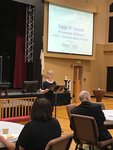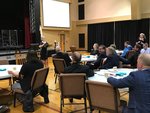

DAPHNE – Small businesses face challenges at all times, but the COVID-19 pandemic has created many more problems for commercial operations in the state, the Alabama director of the National Federation of Independent Businesses, said Wednesday, March 24.
Rosemary Elebash told members of the Eastern Shore Chamber of Commerce that small businesses are the backbone of commerce in the state. Elebash, who is also chairwoman of the Alabama Small Business Commission, said the commission has been working to get information to businesses during the pandemic.
“What happened last year? COVID,” she told the audience at the chamber’s Eggs and Issues breakfast meeting. “Devastating to small business owners. Absolutely devastating. So, we began to put information on the website that was readily available for businesses so they would know what to do, know what their resources were for COVID.”
She said businesses have been trying to find information about services, such as the Paycheck Protection Program, grants and unemployment benefits.
“You may have employees that you had to lay off because your business got shuttered and you didn't have any need for employees, but you've never had employees file for unemployment before, so you needed that gateway to know how to do that,” she said.
One example of challenges that have come up since the pandemic began is unemployment fraud.
“I've had so many business owners call me and say my employee got an unemployment notice that they're going to get a check,” Elebash said. “They've never missed a day of work and we have to advise them that you've got to go down to the police department and you've got to file for fraud because your identity's been stolen.”
She said unemployment fraud is now in the billions of dollars across the country.
“So who's paying that? The business owners,” she said. “Because of unemployment taxes.”
She said 99.4 percent of the state’s businesses are considered small independent businesses.
“The businesses that make headlines, the ones that we recruit to come here, they are the ones that get all the headlines and they hire 2,000, 3,000, 4,000 people,” Elebash said. “Because we have more than 393,000 small independent business owners in Alabama, if everyone hired one person a year, it is more than any business that we can recruit to come here. Your main street is important.”
She said the Small Business Commission has been working since it was created in 2014 to provide information to Alabama businesses. Many municipalities and some counties in Alabama do not have websites with information that businesses might need to inquire about doing business in an area.
The commission’s website, Atlas Alabama, is at www.AtlasAlabama.gov.
Elebash said the NFIB has also worked on legislation to help small independent businesses in Alabama. The federation has helped pass more than 100 bills in the last 10 years to support small businesses, she said.
One example that Elebash used of how legislation has been needed to help businesses was business delivery licenses. Businesses that are located in one city, but making a delivery to another have been required to buy a license. She said the requirement has created problems for some merchants.
The owner of a battery store in Escambia County found that in order to sell one item to a customer, the license would cost more than the product.
“The battery cost $77,” she said. “Before he could deliver the battery, which was the only time he likely would deliver a product to this small town in Monroe County, he had to purchase a business deliver license for $100 and an issuance fee of $10.”
The NFIB helped get legislation passed to allow merchants to make deliveries without the license if they did less than $10,000 in business in that municipality. She said other cities passed other ordinances to continue to require licenses before the NFIB and legislators passed additional bills to restrict license requirements.
She said another issue facing small businesses is the shortage of trained workers.
“I've heard this every day. I've heard this during COVID. I'm hoping we're getting post-COVID. I'm hearing it post-COVID,” Elebash said. “If you don't have a skill, you don't have a trade and you don't have a license, then you need to learn one of those things. Because that's where the jobs are today.”
She said that when she attended a recent meeting in Point Clear, she noticed how many buildings in Baldwin County are still covered with tarps protecting roofs damaged by Hurricane Sally last September.
“I was surprised to see the number of blue tarps still there and that's lack of supplies and lack of workers,” she said. “But those kinds of skills are what we need.”